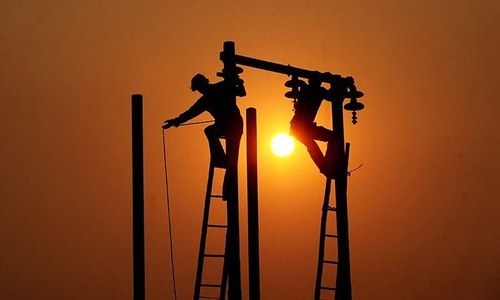ISLAMABAD: As electricity shortfall crossed a record 7,000MW, an angered Prime Minister Nawaz Sharif ordered action against officials who failed to make advance planning for the season, causing problems to people.
“Why didn’t they plan in advance keeping in mind low water availability in dams and severe weather conditions,” an official statement quoted the prime minister as saying when he was informed about the closure of a number of power plants for maintenance.
He was presiding over a special meeting of the Cabinet Committee on Energy — second in less than 10 days.
Electricity shortfall crosses record 7,000MW amid closure of several power plants for maintenance
Informed sources said the power shortfall actually fluctuated between 9,000MW and 10,000MW as maximum demand went past 21,500MW against peak generation of 12,700MW for only 35 minutes by ramping up water discharges from dams. Excluding peak, power generation averaged 11,000MW, but the electricity actually reaching the consumers was less than 9,000MW after accounting for transformational, transmission and distribution losses.
As a consequence, duration of loadshedding increased to 14-16 hours in urban areas and most of the time loadshedding was unscheduled in view of system challenges. Loadshedding in rural areas was even worse, rising to 20 hours. The situation aggravated as one of the largest load centres — Lahore — entered peak levels at 46 degrees centigrade and joined the league of Multan, Faisalabad, Bahawalpur and Dera Ismail Khan.
However, official sources claimed the maximum gap at 7,000MW on the basis of 19,500MW of demand and 12,500MW of production. They said hydropower generation peaked at 2,500MW, along with 1,900MW production from public sector companies and about 7,000MW from independent power producers.
While reviewing the situation, the prime minister expressed “dissatisfaction over the negligence of departments concerned” over the latest power situation that has put the government in an awkward political position at one of the most challenging times and ahead of the Panama Leaks case judgement.
The meeting reviewed factors behind lower power generation. The Ministry of Water and Power explained that an unexpected surge in the intensity of hot weather suddenly increased the demand having an impact of more than 2,500MW while dams did not have required water level. The ministry expressed the hope that the rise in temperature would result in improved river flows, which would lead to an increase in hydropower generation.
This did not satisfy the prime minister. He expressed displeasure over the explanation of the ministry and “directed that responsibility be fixed on officials for not planning proactively so that the situation does not re-surface”, without realising that the chief architect of power sector planning had already been eased out a few days ago.
Mr Sharif said all resources should be set in motion to reduce current shortfall and provide maximum relief to people through as much reduction in loadshedding as possible. “The discomfort caused to people should be rectified at the earliest and steps should be taken on war footing to maximise power generation”, he said.
Official sources said the former secretary of water and power had stopped circulation of energy data about six months ago and switched off television screens in the ministry and field formations showing real time generation and consumption patterns.
Informed sources said it was strange that a number of power plants were allowed by the ministry to go on ‘scheduled maintenance’ in April when weather advisories had already been issued by the Meteorological Department, instead of planning their maintenance during lean days.
They said the most crucial challenge for the operational staff of the power sector was to switch power supply from south to north mainly because of transmission system deficiencies.
For example, a critical transmission line for evacuation from two power plants at Uch at a time is still missing though the prime minister was misled into inauguration of Uch-II plant three years ago.
A power sector expert said the power ministry had focused its attention on media management and article writing over the last three years as it benefited from the historically low oil prices, non-notification of tariff determinations and levy of a series of surcharges to charge around Rs5 per unit higher rates to consumers over those approved by the power regulator. On top of that, weather conditions over the last three years remained normal. Even then the recoveries could not pick up and line losses remained generally unchanged.
Published in Dawn, April 19th, 2017














































